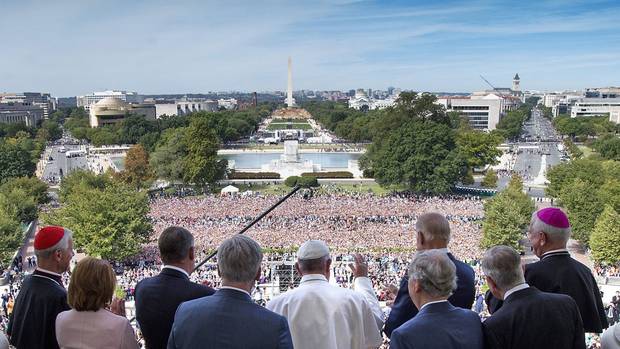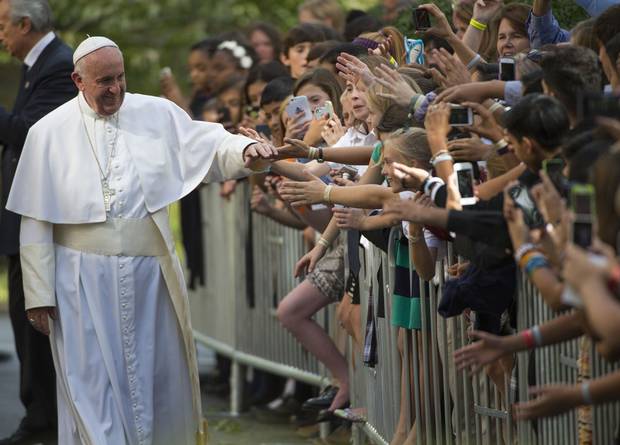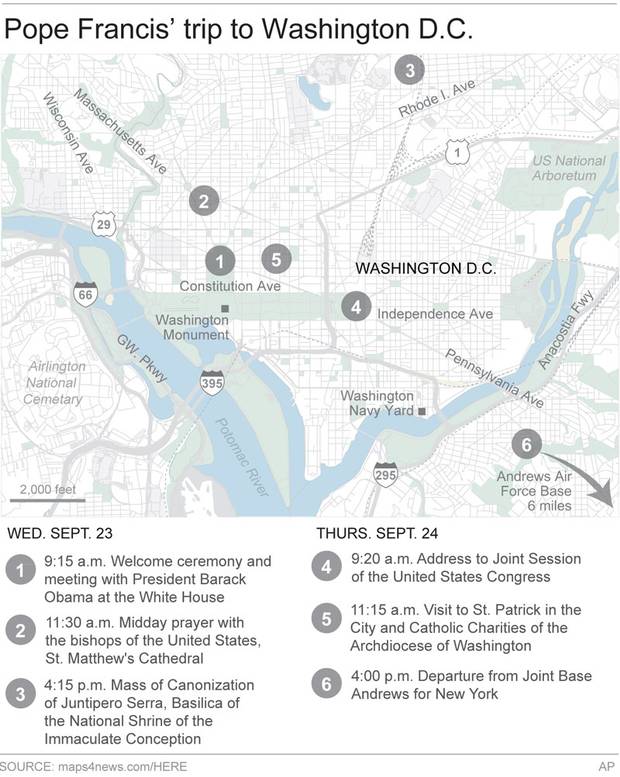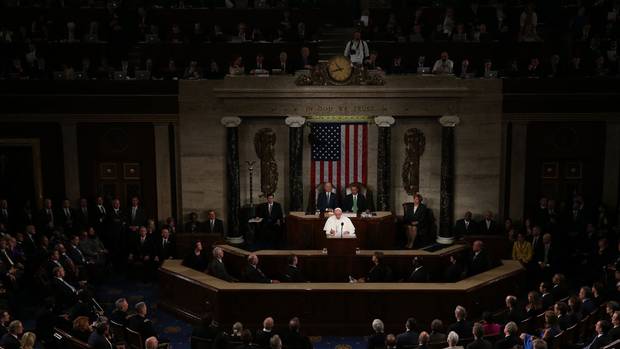The little grey Fiat surrounded by hulking black armoured Suburbans rolling toward the Capitol was a curious study in contrasts and one of Washington's more improbable motorcades in decades.
Inside the Fiat was Pope Francis, humble but keen to speak truth to power.
Outside, lining the route, huge adoring crowds, rare in often-jaded Washington, gathered to cheer the immensely popular pontiff as he juggled the sometimes discordant roles of visiting head of state and spiritual leader with a message.
Clad in all-white papal robes and speaking softly in heavily accented English, the Pope delivered a clarion call Thursday to a rare joint meeting of Congress. He told the assembled lawmakers of the world's sole remaining superpower that they need to care more for humanity's shared planet and those seeking refuge and less about dealing weapons of death to brutal regimes and vilifying Muslim extremists.
In a powerful hour-long speech, the political centrepiece of the 78-year-old pontiff's six-day, three-city visit to the United States, Pope Francis urged U.S. legislators to set aside petty difference and show real compassion and leadership.
"Our world is facing a refugee crisis of a magnitude not seen since the Second World War," he said, adding: "On this continent, too, thousands of persons are led to travel north in search of a better life for themselves and for their loved ones, in search of greater opportunities. Is this not what we want for our own children?"
It was a direct challenge to the recent chorus of threats – largely from Republican presidential candidates – to round up and forcibly expel millions of undocumented migrants, many from Latin America.
"Millions of people came to this land to pursue their dream of building a future in freedom," added the Pope, himself the son of Italian immigrants to Argentina. He has been outspoken in tackling migration and climate change, two of the most bitterly divisive issues in Washington.
Donald Trump, for instance, currently the front-runner among Republican presidential hopefuls, has called Mexican migrants rapists and criminals, and has vowed to build a wall along the southern border.
Hispanic Americans, now the largest minority in the United States and are crucial to Republican hopes of winning the White House in 2016, also represent the fastest-growing segment of the 70-million-strong Catholic Church in the U.S.
The Pope also warned against simplistic efforts to divide the world into good and evil – a pointed jibe at those in the United States inclined to view Islam as inherently violent and extremist.
"Our world is increasingly a place of violent conflict, hatred and brutal atrocities, committed even in the name of God and of religion," he said but added that "no religion is immune from forms of individual delusion or ideological extremism."

Pope Francis waves to the assembled crowd from the Speakers Balcony at the U.S. Capitol with members of Congress, Thursday, Sept. 24, 2015, in Washington after he addressed a joint meeting of Congress.
Doug Mills/The New York Times
The first pontiff from the Americas has also proved wildly popular, attracting the biggest crowds seen in Washington since President Barack Obama's first inauguration. An estimated 50,000 gathered on the lawn in brilliant fall sunshine to greet him when he appeared on the Speaker's balcony after his address.
" Buenos dias," he called out and the crowd roared in response. He asked for their prayers, adding: "If among you there are some who don't believe or who cannot pray, I ask that you send good wishes my way." It was just the sort of candid comment and unscripted moment that has won the hearts of many.
On Wednesday, he had stopped en route to the White House to chat with children lining the road, delaying the official welcoming at the White House for a few minutes.
Security was tight with barricades and streets blocked off, and cordons of police.
As he toured, either in a white-painted Jeep Popemobile or the little Fiat, the Pope seemed invigorated by the crowds.

Pope Francis greets well-wishers as he leaves the Apostolic Nunciature to the United States on September 24, 2015 in Washington, DC.
MOLLY RILEY/AFP PHOTO
Inside the packed House of Representatives chamber, he had told lawmakers, jurists, diplomats, cabinet members and senior military officers that they should embrace the "the strangers in our midst" and see migrants not as waves of dangerous aliens to be shunned and thwarted.
He was similarly straightforward on climate change, another issue that has become bitterly partisan in Washington. Mr. Obama has basked in the Pope's calls to curb emissions from fossil fuels as he attempts add action on climate change to one of his achievements.
"The environmental challenge we are undergoing, and its human roots, concern and affect us all," the Pope said, urging Congress to cut greenhouse-gas emissions to "avert the most serious effects of the environmental deterioration caused by human activity."
It won him a standing ovation from many Democrats and stony silence from most Republicans.
Even less welcome was his direct challenge to lawmakers in the world's largest exporter of weapons.
"Why are deadly weapons being sold to those who plan to inflict untold suffering on individuals and society?" he asked, and then, answering his own question, he said: "The answer, as we all know, is simply for money: money that is drenched in blood, often innocent blood. In the face of this shameful and culpable silence, it is our duty to confront the problem and to stop the arms trade."
From the dais of the House of Representatives, in front of a huge American flag and with the words "In God We Trust" chiselled into the wall above his head, the Pope spoke for just under an hour.
The Pope addressed the joint meeting as a visiting head of state. Purely religious leaders, such as the Dalai Lama, have also addressed Congress but only in auditoriums, not in either of the legislative chambers. Others, like the Queen, who is both the head of a church as well as sovereign, have previously addressed joint meetings of Congress.
Pope Francis also called for "global abolition of the death penalty." The United States, along with Iran and China, ranks among the top three nations still imposing the death penalty.
He made no direct mention of same-sex marriage, euthanasia or abortion, all issues that have riven American society. But conservatives found some solace in the Pope's call to "protect and defend human life at every stage of its development."

As with everything in Washington, partisans tended to hear what they wanted to hear.
For instance, Senator Ted Cruz, the Texas Republican and Tea Party favourite and another 2016 candidate, lauded the Pope as a "powerful voice for life, a powerful voice for marriage [and] a powerful voice for religious liberty." But he made no reference to the Pope's statements on immigration, arms sales or climate change and said he disagreed with him on the death penalty.
Leaving Congress, the Pope visited with some of Washington's hordes of homeless at St. Patrick Parish, roughly equidistant from the White House and the Capitol but a stark contrast to the high-priced eateries serving the capital's powerful elites. Then the Pope mingled with a crowd of Catholic Charities' volunteers who provide shelter and meals to the needy.
Later, he flew to New York where he will deliver a speech to the United Nations, lead a throng in Central Park and a mass at Madison Square Gardens.
The visits end in Philadelphia this weekend.
What the Pope said:
Climate change
"Now is the time for courageous actions and strategies, aimed at implementing a culture of care and an integrated approach to combatting poverty, restoring dignity to the excluded, and at the same time protecting nature."
Marriage
"Yet I cannot hide my concern for the family, which is threatened, perhaps as never before, from within and without. Fundamental relationships are being called into question, as is the very basis of marriage and the family. I can only reiterate the importance and, above all, the richness and the beauty of family life."
Arms trade
"Why are deadly weapons being sold to those who plan to inflict untold suffering on individuals and society? Sadly, the answer, as we all know, is simply for money: money that is drenched in blood, often innocent blood. In the face of this shameful and culpable silence, it is our duty to confront the problem and to stop the arms trade."
Native Americans
"Tragically, the rights of those who were here long before us were not always respected. For those peoples and their nations, from the heart of American democracy, I wish to reaffirm my highest esteem and appreciation."
Death penalty
"Recently my brother bishops here in the United States renewed their call for the abolition of the death penalty. Not only do I support them, but I also offer encouragement to all those who are convinced that a just and necessary punishment must never exclude the dimension of hope and the goal of rehabilitation."
Immigrants and refugees
"Let us treat others with the same passion and compassion with which we want to be treated. Let us seek for others the same possibilities which we seek for ourselves. Let us help others to grow, as we would like to be helped ourselves."
